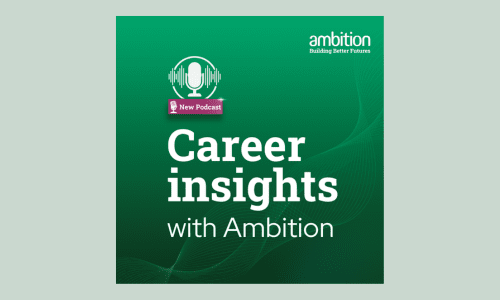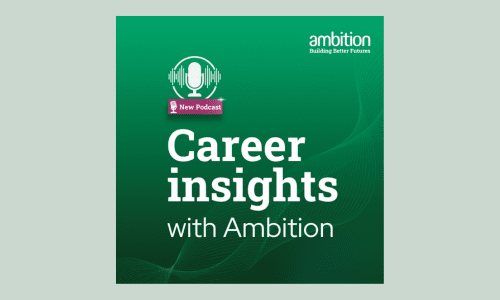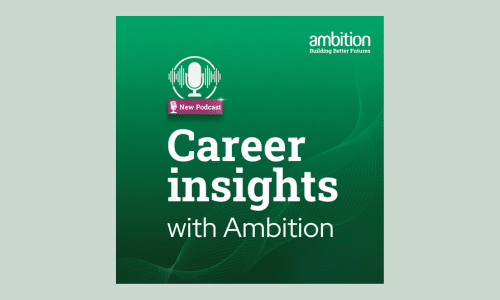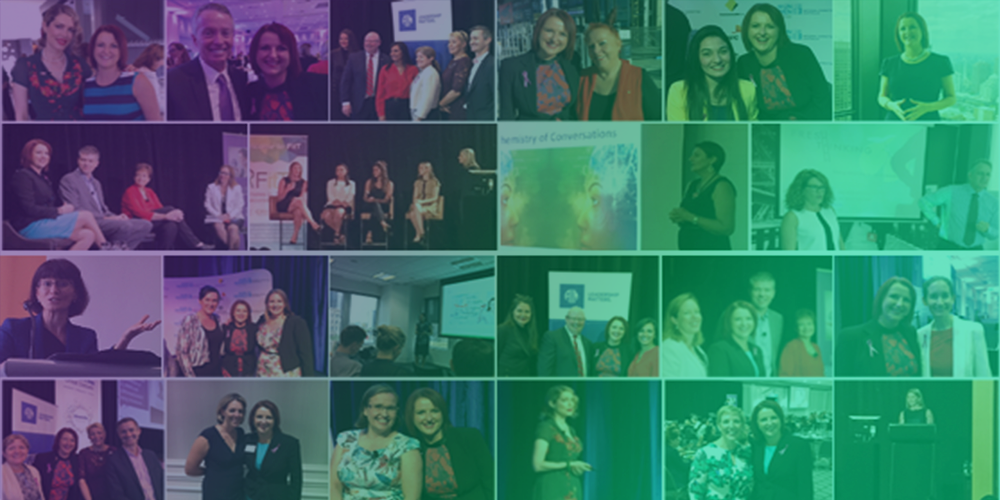Career insights with Ambition podcast
The podcast that dives deep into the defining moments of influential business leaders across technology, accounting and finance.

The podcast that dives deep into the defining moments of influential business leaders across technology, accounting and finance.

The podcast that dives deep into the defining moments of influential business leaders across technology, accounting and finance.

The podcast that dives deep into the defining moments of influential business leaders across technology, accounting and finance.



The month of March has been packed with Diversity & Inclusion events across Australia in celebration of this years’ “International Women’s Day” and “Harmony Day”.
I was fortunate to attend a variety of events, as either an Attendee or Speaker, and it was obvious to me that there’s a noticeable shift this year in the key messages being shared. Hardly surprising, since this year's International Women's Day resounding message is, "Be Bold for Change".
Encouragingly, each year there’s an increase in participation of ‘International Women’s Day events’ and an influx in both Diversity & Inclusion, and more specifically, Gender Diversity events throughout the month.
This year, however, I also noticed the shift, in many instances, from general awareness and information sharing to ‘a call for action’. No matter what our audience group was, many Speakers or Facilitators took every appropriate opportunity to share insights into what organisations are doing well, and where action can be taken to gain sustainable results in Diversity & Inclusion strategies and execution.
My own contribution, whether speaking on the topic of Diversity & Inclusion as a whole, Gender Diversity or on the topic of Flexible Working, included the recommendation of specific actions which I believe both leaders and Individuals should foster in order to ensure significant progress and sustainable cultural alignment. I firmly believe that a key success factor is to ensure a project plan is in place. A project plan will ensure that simple, yet important steps aren’t missed, such as; current research, your business case, sponsorship, planning, steering, reporting, benefits tracking, and of course, setting an appropriate budget and engaging sufficient resources are in place!
Clearly, Diversity & Inclusion involves so much more than ‘gender diversity’. ‘Harmony Day’ enabled organisations, such as Allianz, to embrace the opportunity to celebrate cultural diversity month throughout March. This included a range of educational events and opportunities for employees to get involved in a broad range of events and workshops. Ambition employees had fun by participating in the ‘Harmony Day Pledge’, and it’s encouraging to see that this day is being more widely celebrated here in Australia each year.
Professor Isabel Metz, from Melbourne Business School shared her research into the slow progress of gender diversity across a range of organisations. It’s clear that after 31 years of Equal Employment Opportunity legislation in Australia, women continue to be underrepresented in senior leadership. New research suggests that most organisations have not created gender-inclusive workplaces and even in those which have implemented diversity strategies, managers do not understand what sets of practices are effective in managing gender diversity.
Dr Jess Murphy highlighted sponsorship as critical to career success, yet, “women are over-mentored and under-sponsored”. It requires a collective development for both men and women to ensure success and address hidden issues such as ‘affinity bias’ in the process.
A key component of any relationship, such as coach, leader, mentor or sponsor, is feedback. During the launch of the Chief Executive Women’s, ‘Advancing Women Australia Parity Study’, it was noted that ‘clear feedback correlates very strongly with promotion rates’, however women are significantly less likely to receive feedback than men. Many speakers spoke on this topic, and the resounding message was that women will benefit from eliciting feedback and sponsorship, leaders should ensure consistency in providing it, and organisations should educate on the art of giving and receiving feedback.
This was a common theme for the broad range of topics. To ensure progress with gender diversity a holistic focus is required; for organisations set the strategy, tracking and ongoing commitment, for leaders to support and role model, for women seek out feedback and opportunities to develop further, and as Adam Fennessy stated, “Men in position of power and authority” must take action, through enabling flexibility, effective leadership and story-telling.
Tara Moss spoke of the Bechdel test, a simple test for movies, which names the following three criteria: (1) it has to have at least two women in it, who (2) who talk to each other, about (3) something besides a man – and quite remarkably, very few ‘pass’!
On a more sombre note, Tara also spoke of the alarmingly high statistics of quotes from female victims highlighted in the media, and relayed examples of male perpetrators being portrayed more positively in the media than their female victim!
It’s no wonder there is such limited progress for gender equity, whilst the media aids in defining our unconscious reasoning through all communications and broadcasting forums.
Kelly Ferguson called out the need for schools to embrace the opportunity for all children to use tools such as, 'Raspberry Pi' , and more recently in the news, we are hearing of schools using fairy tales to assist children in identifying stereotypes and gender bias.
Dr Marguerite Evans-Galea spoke of a social experiment developed in 1983 whereby 4807 primary school children participated in a 'draw a scientist' test (developed by David Wad Chambers) proving that from a very early age, stereotypical views of such careers were evident, progressing significantly throughout the years.
Just as our education system is making progress into this, Parents are encouraged to have conversations early with children about bias and stereotyping.
Unconscious bias continues to be a topic widely debated. Many feel that facilitating workshops to identify this will ‘normalise’ it. I’m sure if there’s no action plan following this awareness that would likely be the case. Just like any systemic change, however, it will take an ongoing commitment to ensure new behaviours are embedded.
On the topic of bias, Div Pillay brought to the forefront the necessity for ‘white Caucasian women’ to acknowledge their part in the psychological bias that is clearly prevalent within the Australian workforce. At the YPWA conference, my fellow Panel members and I also faced into this topic during our gender diversity discussion with reference to unconscious bias, particularly regarding ‘white privilege’. Organisations will need to ensure their diversity and inclusion strategies are not working in silo. A cultural diversity strategy is not effective if it’s not considered within the gender strategy, for example.
It’s impossible to capture all the key insights, statistics shared and ‘calls to action’ from the incredible collective of Speakers at these events, but I trust you’ll agree, it’s highly encouraging to see the progress and commitment from so many individuals and organisations in the drive for workplace diversity and inclusion.
Key messages for me are:
Ensure your diversity and inclusion strategy is a holistic strategy, not a number of equity group strategies in silo
Take actions aimed at preventing bias
Ensure leaders are consistent in all practices, such as providing feedback, performance review, career opportunities and development
Focus on sponsorship of men and women
Parents and teachers have the opportunity to assist children in avoiding stereotype mind-sets
Continue embracing diversity, celebrating diversity and striving towards a diverse and inclusive Nation!
If you’d like to hear more or discuss how we can assist with your diversity and inclusion strategy or challenges, please feel free to contact me personally.
Pictured above (in alphabetical order)
Adam Fennessy, Secretary of Victorian Government’s Dept of Environment, Land, Water & Planning
Caitlin Lies, CEO, Xchange
Craig Tiley, CEO, Tennis Australia
David Hassan, CIO, PetSure
Diana Hewitson, Head of Diversity & Inclusion, Ambition Group
Div Pillay, CEO, MindTribes
Geraldine Cox, Founder of Sunrise Cambodia
Professor Isabel Metz, Executive Director, Melbourne Business School
Jacqui McNamara, Chair, FITT
Janelle Weissman, Executive Director, UN Women
Dr Jess Murphy, Ambition Elite Partner
Joanne Hayter, CEO, International Women’s Development Agency
Kate Boorer, Founder, Young Professional Women Australia
Kate Jenkins, Sex Discrimination Commissioner Australia
Kate Steenkamp, Transformation Lead, Caltex
Katrina Small, HR Executive, Alleasing
Kelly Ferguson, CIO, Origin
Maree Burgess, Ambition Elite Partner
Dr Marguerite Evans-Galea, Executive Director, Industry Mentoring Network in STEM
Mel McGoldrick, Ambition Elite Partner
Muniba Mazari, UN Ambassador, Pakistan
Solange Cunin, CEO & Founder of Cuberider
Tara Moss, Author, Model & UNICEF Ambassador for child survival
Tim Draffen, Ambition Elite Partner
Assoc. Professor Tony Walker, Ambulance Victoria